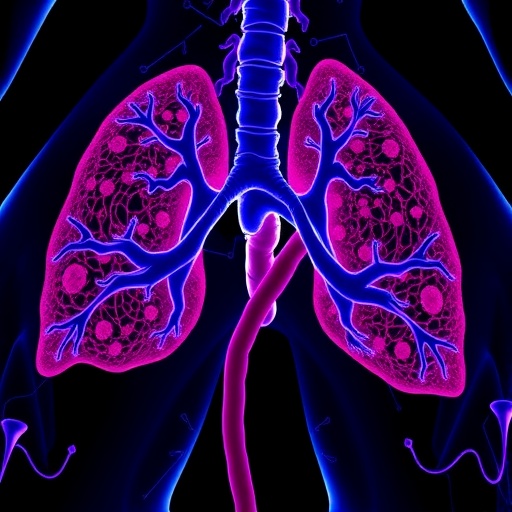
A groundbreaking study from Baylor College of Medicine has unveiled new molecular insights into muscle-invasive bladder cancer (MIBC), a particularly aggressive form of bladder cancer that often defies standard chemotherapy treatments. Despite chemotherapy being the frontline approach for these cancers, only about 25% of patients experience substantial benefit. This alarming statistic has driven researchers to dig deeper into tumor biology with the aim of uncovering why many tumors resist treatment and to pave the way for more effective therapies.
Utilizing a sophisticated multi-omics methodology, the Baylor research team conducted a comprehensive molecular characterization of 60 MIBC tumor specimens. This approach integrates genomics, transcriptomics, proteomics, and phosphoproteomics — each adding a distinct layer of biological information. Genomics involves sequencing the tumor’s DNA to detect mutations and structural variations, while transcriptomics examines gene expression profiles to determine which genes are active or silent. Proteomics and phosphoproteomics then extend this analysis to the protein level, revealing the abundance and activity states of proteins, which are the ultimate effectors of cellular behavior.
The integration of these data layers allowed the researchers to generate detailed molecular profiles that uniquely represent each tumor’s biology. Applying advanced computational analyses, they sought to correlate specific tumor features with responsiveness or resistance to chemotherapy. This granular and multifaceted approach transcends conventional single-omics studies, embracing the complexity of cancer biology and offering more nuanced insights.
.adsslot_kv9ZMcKoSw{width:728px !important;height:90px !important;}
@media(max-width:1199px){ .adsslot_kv9ZMcKoSw{width:468px !important;height:60px !important;}
}
@media(max-width:767px){ .adsslot_kv9ZMcKoSw{width:320px !important;height:50px !important;}
}
ADVERTISEMENT
One surprising discovery highlighted the critical importance of proteins and their isoforms — subtly different versions of the same protein that emerge through alternative splicing or other post-transcriptional modifications. Specifically, certain isoforms of proteins such as ATAD1 and members of the RAF kinase family were more prevalent in tumors that showed a positive response to chemotherapy. These isoforms could not be identified through DNA or RNA analysis alone, underscoring the indispensable role of proteomics in cancer research and biomarker discovery.
In tandem, the study identified critical signaling pathways implicated in chemoresistance. The Wnt signaling pathway, notable for its role in cell proliferation and differentiation, was markedly more active in resistant tumors, particularly through the regulatory protein GSK3B. Likewise, hyperactivation of the JAK/STAT pathway, specifically through the transcription factor STAT3, was observed in non-responsive cancers. These pathways represent promising therapeutic targets; modulating them could potentially re-sensitize tumors to chemotherapy or halt their progression.
Moreover, the team investigated the expression patterns of proteins targeted by emerging antibody-drug conjugates (ADCs). ADCs are an innovative class of therapeutics that fuse antibodies with cytotoxic drugs to selectively attack cancer cells. Proteins such as PD-L1, TROP2, and NECTIN-4, which serve as ADC targets, displayed heterogeneous distribution across tumor subtypes. This variability suggests that tailored combinations of ADCs with chemotherapy or immunotherapy might elevate treatment efficacy, particularly if therapies are aligned with each tumor’s unique molecular signature.
Another compelling aspect of the study involved longitudinal analysis — comparing tumors before and after chemotherapy. Some tumors demonstrated a shift in their molecular subtype post-treatment, a phenomenon that might reflect adaptive resistance mechanisms. Intriguingly, proteins associated with autophagy (cellular recycling) and energy metabolism increased after chemotherapy exposure, implying that tumors might exploit these processes to survive therapeutic stress.
This extensive molecular profiling not only identifies biomarkers predictive of treatment response but also suggests novel intervention strategies for overcoming chemoresistance. By illuminating the biological underpinnings of resistance, this research holds the potential to expand the fraction of MIBC patients who respond effectively to existing therapies and to stimulate the development of next-generation treatments.
According to Dr. Matthew V. Holt, first co-author and director of the Proteomics Laboratory at Baylor’s Lester and Sue Smith Breast Center, their objective was to go beyond traditional genetic tests and identify molecular markers that distinguish responders from non-responders to chemotherapy. “Proteins and their isoforms provide a richer, more functional insight into tumor behavior,” he explained, emphasizing the added value of direct protein analysis.
Dr. Yongchao Dou, co-first author and assistant professor in the Breast Center, noted the importance of dissecting signaling cascades that drive resistance. “Pathways like Wnt and JAK/STAT are not only markers but also mechanistic players in how tumors evade chemotherapy. Targeting these may be key to reversing resistance.”
Senior author Dr. Seth P. Lerner, professor of urology and director of Baylor’s Multidisciplinary Bladder Cancer Program, remarked on the clinical implications of these findings. “Muscle-invasive bladder cancer remains a tough challenge in oncology. This work provides a roadmap for expanding effective treatment options and improving survival rates.”
Supported by grants from multiple institutions, including the Bladder Cancer Advocacy Network and the NIH, the study embodies a collaborative, multidisciplinary effort involving a diverse team of scientists and clinicians at Baylor College of Medicine. Their combined expertise in genomics, proteomics, computational biology, and clinical oncology culminated in this landmark contribution to bladder cancer research.
As the field advances, integrating proteogenomics into routine cancer diagnostics could revolutionize personalized medicine for bladder cancer patients. By capturing the full spectrum of tumor molecular life—from DNA to active protein isoforms—this approach is poised to refine patient stratification, therapy selection, and ultimately clinical outcomes.
The study’s findings, published in Cell Reports Medicine, underscore a critical paradigm shift: effective cancer treatment requires looking beyond the genome to understand the dynamic proteomic landscape that dictates tumor response. This refined lens opens new avenues for battling chemoresistance and enhancing therapeutic precision in muscle-invasive bladder cancer.
Subject of Research: People
Article Title: Proteogenomic characterization unveils biomarkers associated with chemoresistance in muscle-invasive bladder cancer
News Publication Date: 31-Jul-2025
Web References:
https://www.cell.com/cell-reports-medicine/fulltext/S2666-3791(25)00328-3
http://dx.doi.org/10.1016/j.xcrm.2025.102255
Keywords: Health and medicine; Diseases and disorders; Clinical medicine; Human health; Medical specialties; Omics
Tags: advanced computational analyses in oncologyBaylor College of Medicine bladder cancer studychemotherapy resistance in bladder cancerclinical implications of chemotherapy resistancefuture directions in bladder cancer researchgenomics and transcriptomics in tumor analysismolecular characterization of muscle-invasive bladder cancermulti-omics methodology in cancer researchpersonalized therapies for bladder cancerproteomics and phosphoproteomics applicationstumor biology and treatment resistanceunderstanding tumor microenvironment in MIBC





